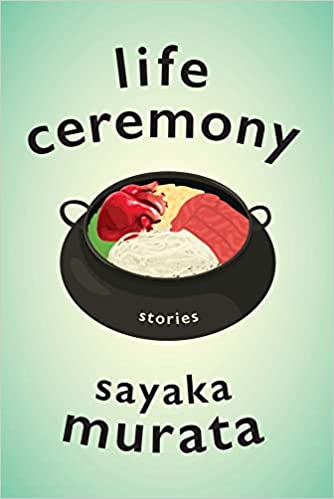Life Ceremony has got to be the most creative way to say fuck you to norms!
I read this book along with I Who Have Never Known Men, and quite honestly, I don’t know how I am still sane right now.

Title: Life Ceremony
Author: Sayaka Murata translated by Ginny Talley Takemori
Published: June 26, 2014 by Penguin Press
Genre: Asian Literature, Fiction, Horror, Japan, Japanese Literature, Literary Fiction, Short Stories, Translated Works
This book, Life Ceremony, is Sayaka Murata’s first collection of short stories to be translated into English. You might be familiar with her from her other works like Convenience Store Woman and Earthlings, two of her full-length books. Murata’s work often is uncanny and otherworldly, and she’s known for challenging societal norms through her unique characters– or at least that is how I see it.
In this collection, Murata offers twelve stories some of which includes, “A First-Rate Material,” which features a couple, Nana and Naoki, whose engagement is threatened by Naoki’s aversion to using deceased bodies as clothing and furniture—a common practice in their world. Another story, “Lovers on the Breeze,” is told from the perspective of a curtain in a child’s room that becomes envious and tries to interfere when the girl, Naoko, has her first kiss. “Eating the City” is about a girl who forage in the city, while “Hatchling” portrays someone struggling hard to fit in with societal expectations.
Right off the bat, this book introduces a compelling and unconventional story about a couple living in a world where deceased bodies are repurposed into objects and adornments. This practice represents their way of honouring the dead, creating a disorienting experience that I did not anticipate. As I often avoid reading summaries to preserve the element of surprise, this book certainly delivered on that front.
In the subsequent pages, the book effectively demonstrates how we become uncomfortable with things that are not normal to us and how we react to the strange plot presented in the book. I can’t help but feel that while the people in the book seem abnormal, I might just as well be the abnormal one.
What I believe the book ultimately succeeds in is demonstrating how our rituals and practices can be trivial and silly, easily transformed over time. And norms are just honestly silly… As years go by, what we consider normal could come to be viewed as strange.
final thoughts…
I appreciate this book for its shock value and the level of interest it was able to sustain throughout. It also provokes a lot of questions in me, which is always a good sign that the book is good.
However, the things I like about the book could have easily been criticized from a negative angle on Goodreads. Ah, how reflective of the book, isn’t it?
This book is suited for those who enjoy similarly unconventional works, maybe something like The Vegetarian by Han Kang.
Leave a Reply